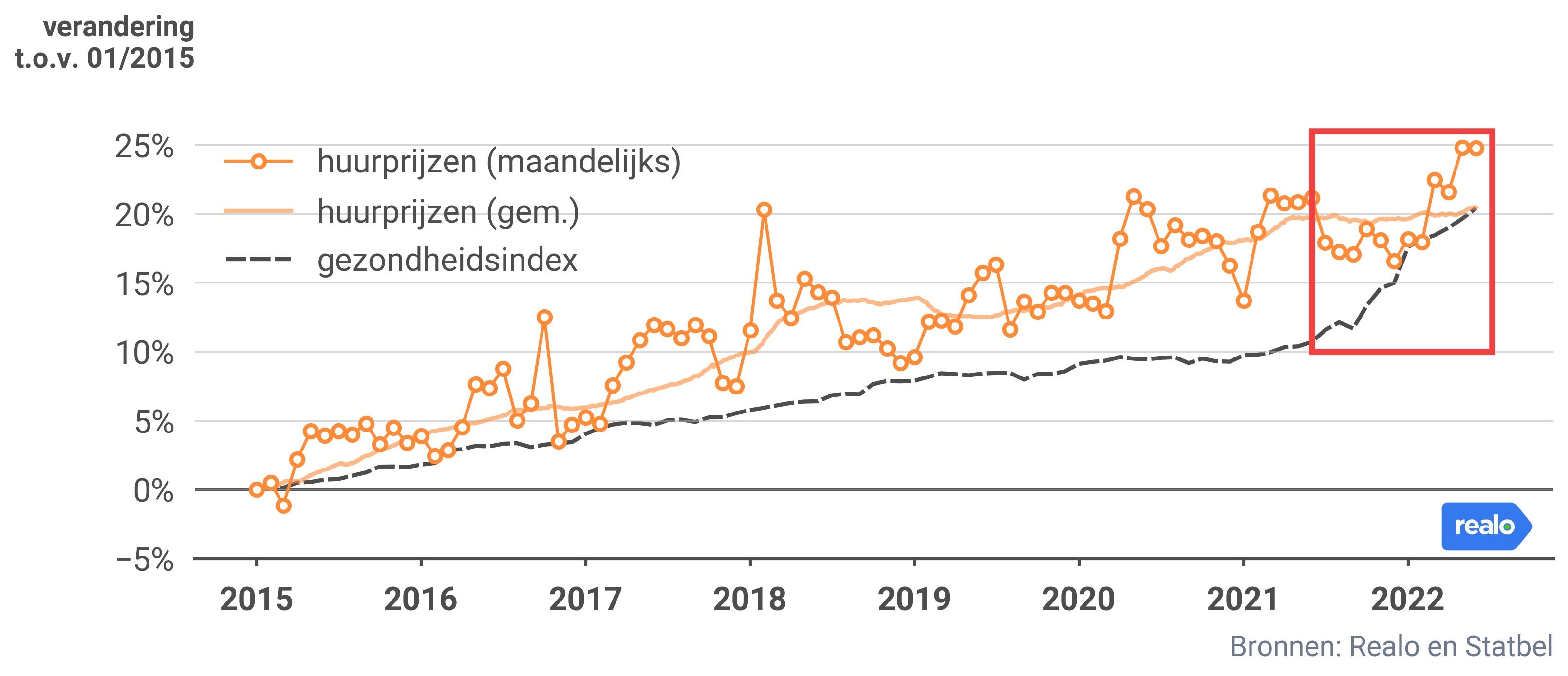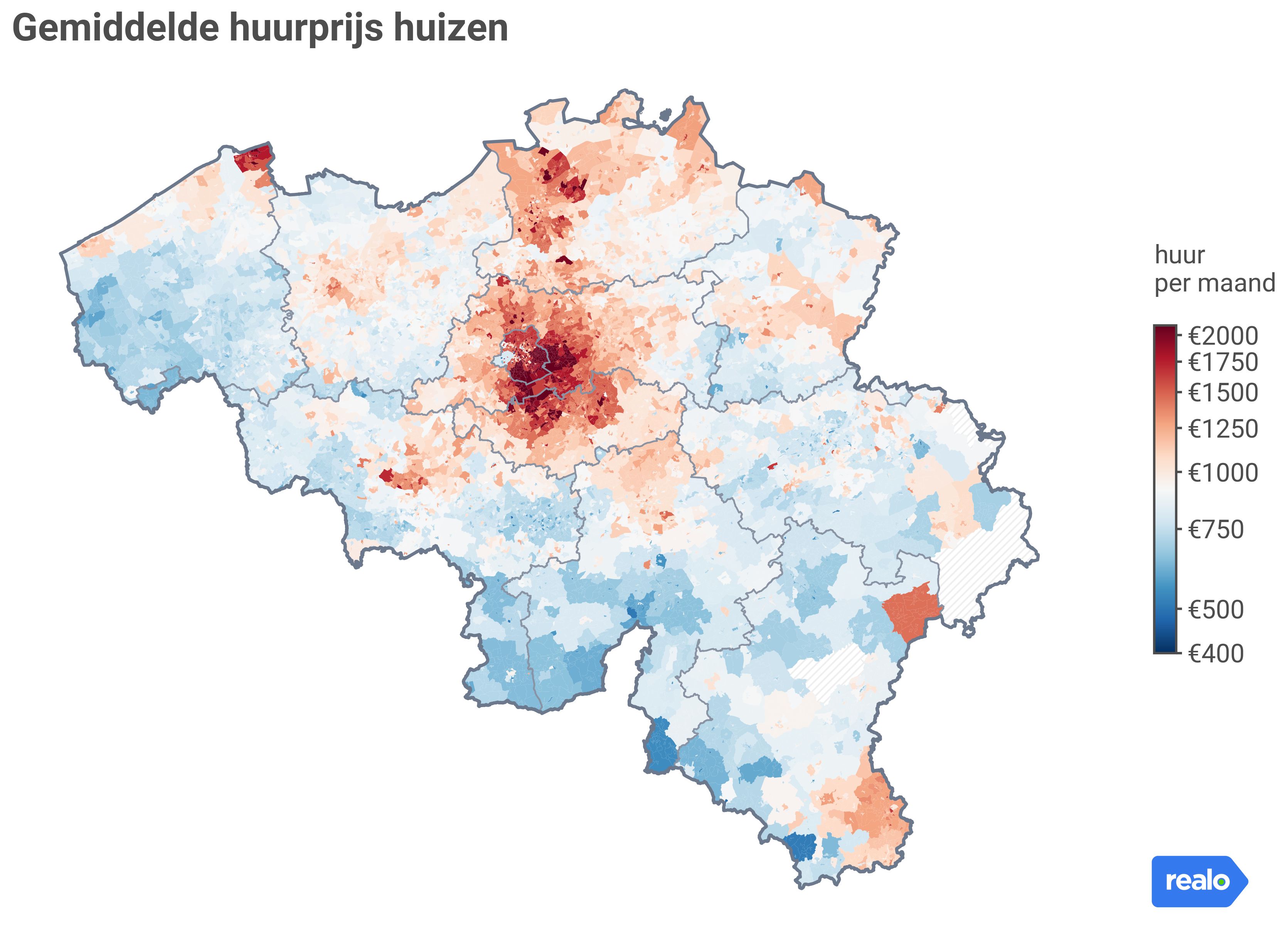Rents rise sharply in second quarter
After a long period of reasonable stability on the Belgian rental market, rents now seem to be finally succumbing to the pressure of inflation. Houses became 6% more expensive to rent in the second quarter of 2022 and apartments 2.3%. Last week, Statbel announced that the inflation rose to 9.65% in June, the highest level since October 1982. Hand in hand with the inflation figures, the health index continued to rise in the second quarter of 2022. Important, because that index determines how much rents in our country may be indexed. Rents initially seemed to stagnate in the previous quarter, but the jump at the end of the first quarter has therefore continued . Thus, we can see that the health index started rising much more strongly from June 2021 approximately (see red box). Only from March 2022 can we discern a similar upward trend in rents. So it seems that the rental market reacted to the higher inflation rates with a reasonable delay.

However, current rents only refer to homes that have re-entered the market and therefore do not tell us how rents have evolved for homes that are still under contract. The evolution of the health index is a good indicator for this. Presumably, the sharp price increase in the rental market is currently a counter-reaction by landlords to the continued rise in inflation: by raising the rent slightly, new landlords are anticipating a further increase in the figures. After all, the next time that the rent may be indexed will not be until the following year, when prices will probably be much higher. According to the National Bank of Belgium we would be at the peak and inflation will drop to 2.6% by 2023. How accurate those projections are and whether the rental market responds faster to this remains to be seen.
Rent prices of houses above €1,000
Three quarters of homes placed for rent in Belgium in the second quarter of 2022 were flats (compared to a quarter houses). On average, a flat was rented out at €820 per month. Prices were generally lower in Flanders (€770) and Wallonia (€682), though, as a significant proportion of flats are in the Brussels Capital Region, where rents are much higher than in the rest of the country (€1058). Comparing last quarter's prices with the previous 12 months, flat prices rose by 2.29%, very similar to what we saw in the first quarter (+2.25%).

In contrast, house rents rose much faster in the last quarter, by 6%. Nationally, the average rent exceeded the symbolic €1000 mark, to €1003. Excluding the Brussels-Capital Region, average house rents are 'only' at €955. Within the Brussels Capital Region, you pay an average of double the monthly rent for a house compared to the rest of Belgium, at €1880. Compared to the previous 12 months, that is an increase of just under 10%, while in Flanders and Wallonia it was only 5%.

As in the previous quarter, the top 10 most expensive rental houses and apartments consist almost exclusively of municipalities in the Brussels-Capital Region and Flemish Brabant. Moreover, the provinces around Brussels are also the strongest risers in the last quarter. Rents for apartments increased in Walloon Brabant by 5.35% and in Flemish Brabant by 3.68%. For houses, rents increased even more with 6.23% in Walloon Brabant and 7.5% in Flemish Brabant. On average, you can now rent a house there for around € 1335 or an apartment for € 840. Hainault and Namur remain the cheapest municipalities to rent an apartment at €653. Somewhat surprising, but in line with the previous quarter, you can find the cheapest rental houses in West Flanders, you pay an average of € 809 per month in rent. In Vleteren and Poperinge, for example, it costs less than € 700 on average. Hainaut is again the cheapest province in Wallonia to rent a house, averaging € 822.
How expensive is renting in your municipality? Find out here!
Technical framework